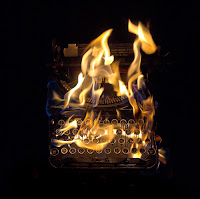Manuscripts don't burn
So I'm fascinated with typewriters at the moment. A classic case of medium overshadowing message, but I'm convinced that a typewriter would make me a better writer. Just me and the page and the ink smudges, no Spotify or Twitter to distract me, a forced slowing down of time. A return to the era when writing meant something. I would instantly become Truman Capote, Ernest Hemingway, Zelda Fitzgerald. My editor would come around in a pinstripe suit and newsboy cap, gnawing on a cigar, and the authenticity would be transcendent.
Unfortunately, typewriters are both expensive and impractical, so I did what any good twentysomething would do and found a typewriter simulation app for my computer.
It's called Winston. It shows you a graphic of a typewriter with animated paper (you can set "pristine", "sepia" or "crumpled") and makes old-fashioned clickety-clack sounds as you type. The carriage return dings its little bell. Hitting back-space produces a haze of black X's all over your spelling errors and bad turns of phrase. It comes pre-loaded with three soft-focus backgrounds so you can set up your imaginary typewriter in a mahogany-paneled study, a cozy diner, or a countryside solarium. Its name is Winston. It redefines twee and I loved it instantly.
I put on some music and settled in on the couch to write. The words were on the page, as indelible as pixels can be, as I discovered the first forty-seven times my fingers slipped and hit the wrong letter key. It was forcing me to be honest - there was no copy-pasting here, no mass deletion. I couldn't make my first draft look like a final draft and pretend my writing came fully formed from the head of Zeus. The first draft was terrible. So I pulled the paper out of the typewriter, set it aside, and loaded in a new sheet.
The second draft went better. My piece was taking shape, slowly but surely. I had found the secret to the creative process, and it was a high-tech simulation of a low-tech era.
And then suddenly, Winston vanished and took the paper with him.
I was staring at my usual chaotic computer desktop, fifteen tabs open in my internet browser, a disorganized pile of Word documents half-written and abandoned, twenty emails I didn't want to respond to. Winston had crashed.
OK, don't panic. I restarted the program, fully expecting an autosaved copy of my piece to be there waiting for me. Instead, nothing. The page was empty. No amount of searching in menus and folders could bring my piece back.
Bulgakov said that "manuscripts don't burn," which in the context of the censored and repressed 1950s in the Soviet Union was a powerful and important statement. Ideas don't burn. Thoughts, concepts, ideals, rights, none of those can be authentically destroyed.
Unfortunately, manuscripts can. I wanted authenticity, I wanted the solid fragility of words on a page, detached from the virtual artificiality of writing on the computer, grounded in physicality, with ink for blood. What I got was the fact that if your paper catches fire, you're fucked. And I'm not sure where the metaphor is in there, aside from a general memento mori and a reminder that I could be run over by a cement mixer on my way to work on Monday.
Maybe Microsoft Word isn't so bad.




Comments
Post a Comment